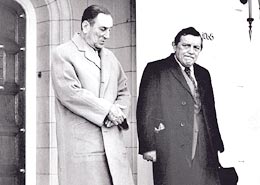This whole site is dedicated to a discussion of the Arabs and Arab culture in Latin America. They are an amazing people.
But there is one group which is an outlier in South America: The Jews.
Now, every country in Latin America has some Jews, but Argentina has LOTS OF JEWS.
And it is Argentine Jews in particular which just fascinate me no end. The have survived and prevailed in a part of the world where one would not even expect them to be.
At roughly 180,000, Argentina has the seventh largest concentration of Jews in the world, and the largest concentration in the Latin World.
At one point, the percentage of Jews in Argentina’s population rivaled that of the United States.
Posted on YouTube: December 24, 2023
By TRT (a normally anti-Israel, Turkish news agency),
but this snippet of history is basically true.
Theodore Herzl even considered purchasing a province in Argentina as a homeland for the Jews. A province! mind you. Not the whole country.
Source: The Jewish State [Der Judenstaat] (1896)
Theodore Herzl, via the Jewish Virtual Library – Section IIPALESTINE OR ARGENTINE?
Shall we choose Palestine or Argentine? We shall take what is given us, and what is selected by Jewish public opinion. The Society will determine both these points.
Argentine is one of the most fertile countries in the world, extends over a vast area, has a sparse population and a mild climate. The Argentine Republic would derive considerable profit from the cession of a portion of its territory to us.
The idea of a Jewish homeland in Argentina was not as crazy as one might think, today.
A Jewish philanthropist, Baron Maurice de Hirsch, had already purchased and set up a Jewish settlement called Moisés Ville (Moses-ville) earlier, in 1889, out on the pampas, in the province of Entre Rios, north of Buenos Aires.
Argentina is a large country, about 1/3rd the size of the United States, and had only 3.4 million people living there in 1890. Large sections of the country were literally uninhabited or scarcely settled.
So the idea of buying an empty Argentine province made sense. Jewish settlement in Argentina had already started, even before Herzl wrote The Jewish State.
Though at the first Zionist Congress in 1897, the possibility of Argentina was discussed, the more orthodox Jews insisted on a return to the Holy Land.
While some Jewish immigration to the Holy Land had started by that point, the area was still under Ottoman (Muslim) control, and it was not developed, and there were instances of hostility to Jewish settlement.
But Argentina was wide open.
So, from the time of the Czars to the time of Hitler, many Jews fleeing pogroms in Europe though that moving to Argentina was a wonderful idea.
And, at the time, it was. Argentina was just beginning to open up, as settlement of the American West was closing down. It was another America in the making, and the government allowed for European immigration.
So yes, there were Jewish agricultural settlements, set up in the pampas, with Jewish gauchos.
However, within one generation, most of the sons and daughters of those Jewish immigrants cum gauchos were moving to Buenos Aires, where they had a massive effect on the culture.
In the rest of South America, Jews were prosperous, but in Argentina, they were trendsetting.
Posted on YouTube, Nov 13, 2023
The Ottomans imposed restrictions on Jewish immigration to the Holy Land before 1917. The British did during the Mandate. And there was hostility from the Arabs.
Even the United States limited immigration starting in the 1920s.
However, Argentina was still welcoming.
Unfortunately, in 1938, the government changed its policy and shut down Jewish immigration because Jews were trying to escape Europe, and Argentina was one of the few open countries … and the government did not want to be flooded with refugees – which was a real possibility at that time.
Of course, there was a degree of antisemitism in the decision. After all, this was just before WWII, when antisemitism was publically acceptable. However there is more to the story. It was not just antisemitism.
In 1938, there were only 13.7 million Argentines, and a flood of a million or more Jews fleeing Europe would have massively changed the demographic profile of Argentina overnight. The Great Depression was in full force, and Argentina could not afford such a large influx.
AND THEN THERE WERE THE GERMANS IN ARGENTINA
Yes, about 8% of Argentina was German at that time, but a lot of those Germans were assimilated second- and third-generation Argentines, with newer German arrivals having fled Nazi Germany.
Many of those German-Argentines were anti-Nazi.
Though sadly, it has to be admitted, there were some Nazi sympathizers who held a rally in Buenos Aires’ Luna Park in 1938.
But, apparently, there were some anti-Nazis as well, who attacked the Nazis after the rally and won the street battles.
Source: Nazi rally in Buenos Aires through rare photographs, 1938
Rare Historical PhotosAlthough forbidden to do so, the Federacion Universitaria Argentina (FUA) and socialist youth groups held a counter-demonstration in nearby Plaza San Martín; the demonstration spilled over into adjacent streets; German flags were burned; German banks and the Instituto Cultural Germano-Argentino were stoned.
The Argentina government had to apologize to Germany for what was considered a diplomatic insult.
Source: Nazi rally in Buenos Aires through rare photographs, 1938
Rare Historical PhotosA few days later, Manuel Alvarado, interim chancellor of the Foreign Ministry, apologized publicly to Chargé d’Affaires, deploring a “certain press” offensive to German nationality that failed to “take into account the cordial relations between the two nations”.
Most Argentines were NOT the Nordic Aryan ideal, and everyone knew it. In fact, some of the military elites feared that Germany might try to lop off a bit of South America to start a German colony. Those officers would have resisted Nazism.
Argentina was never in danger of going Nazi.
What Argentina did have was a large influential Catholic Church which had a history of antisemitism, but while the Catholic Church influenced the culture, they could not totally control it. It also had an elite class of rich ranchers and businessmen, who were sympathetic to fascism, though not necessarily Nazism.
These elitists were sympathetic to the Axis, but the public-at-large was sympathetic to the Allies. What the elite was able to do was delay Argentina’s break with neutrality until near the end of the war.
Yes, a Nazi rally had occurred in 1938, but those Nazi sympathizers did not endanger the state.
Most Argentines were just NOT Nazis.
How could they be? Most were Spanish or Italian, about half of those Latins had a small degree of Indian blood in them. Even Perón boasted of a distant Tehuelche ancestor.
Argentine could never have been a fertile ground for Nazi supremacism.
Jewish immigration resumed to Argentina after WWII.
At that time …
THERE WERE APPROXIMATELY 400,000 JEWS IN ARGENTINA.
Close to 3% of the population, a little bit less that the percentage of Jews in America at that time.

Juan Perón and José Ber Gelbard
Even Juan Perón had a Jewish advisor for economics, José Ber Gelbard.
Source: Wikipedia: History of the Jews in Argentina
Juan Domingo Perón’s rise to power in 1946 in Argentina after the war worried many Jews in the country.[who?] As Minister of War, he had signed Argentina’s declaration of war against the Axis Powers, but as a nationalist, he had earlier expressed sympathy for them. He was known to admire the Italian Fascist leader, Benito Mussolini. Perón introduced Catholic religious instruction in Argentine public schools; he allowed Nazis fleeing prosecution in Germany to immigrate to the country. Perón also expressed sympathy for Jewish rights and in 1949 established diplomatic relations with Israel. Perón’s government was the first in Argentina to allow Jewish citizens to hold office.
What is NOT mentioned is that Perón later ran into conflict with the Catholic Church. He did NOT grovel before the clerics. He was not a classic democrat, but neither was he a neo-nazi.
If after the war, Juan Perón invited in German war criminals, he did so for their supposed technical and scientific expertise, not their politics. Perón himself thought that the Germans were too stiff.
While there were some ugly instances of antisemitism in Argentine history, it was not that strongly embedded in their culture. Usually, whatever antisemitism that did occur was a spillover from government actions against leftists.
During the Tragic Week of 1919, the government cracked down on very violent leftist strikers who were shooting the police. Some of this spilled over to local Jews who had come over from Eastern Europe, and were seen as leftist agitators.
During the Argentine Dirty War (1974-83) leftist Jews were arrested, but for their political activities, not their religion. Unlike Christian Argentines, they were allowed to leave Argentina for Israel. So they got off easier than the Christians.
This is not to excuse government excess, but it was not usually born of religious hatred, but misapplied ideological hatred.
But that is not what the media tells us.
The media likes to portray Argentina as a post-WWII Nazi enclave, which is a gross exaggeration.
IT WAS NOT.
Juan Perón even helped the Jewish community.
A few famous Nazis fled there, but most Argentines were NOT Nazi; and the few Nazis who arrived were allowed in for economic or technical reasons.
Argentina was not a center of German culture, though it had a noticeable (8%) German population.
However, because of unstable presidencys, followed by right wing repressive governments, bad economics, corruption, and the AMIA bombing of 1994 (an Iranian operation), many Jews have left Argentine for Israel.
However, there are still roughly 180,000 Jews in Argentina – 250,000, if you count those with a degree of Jewish ancestry, but who are not considered officially Jewish.
Argentina still has the seventh largest Jewish population in the world.
Why?
Because Argentina is not intrinsically antisemitic. It is intrinsically messed up, but not antisemitic. Many Jews still like Argentina. Governments come and go, some friendly to Jews, some not; but the people of Argentina themselves are not antisemitic.
Posted on YouTube: July 10, 2024
BUT HERE IS THE ODD PART
The Jews in Argentina have affected Argentine culture far more massively than the Germans ever did.
Source: Chabad.org — 19 Facts about the Jews of Argentina
By Eli Levy and Miriam SzokovskiArgentina has produced five Nobel prize winners, including Jewish doctor Cesar Milstein, son of a Jewish Ashkenazi family from Bahia Blanca, who (with others) developed the hybridoma technique for the production of monoclonal antibodies. He was awarded the prize in 1984.
While Argentina Christians invented Tango, a lot of Jews picked it up and wrote their own tangos.
TANGO: A HISTORY WITH JEWS – Trailer
Posted on YouTube: August 6, 2011
One of the most famous restaurants in Latin America is in Buenos Aires and is called Mishiguene (Meshugganeh) which is Hebrew for Crazy. It servers Jewish cuisine, though it is not officially kosher.
Posted on YouTube: November 27, 2011
Posted on YouTube: August 25, 2014
To be sure, there is a lot more, beyond the scope of this blog article.
And, of course, Argentina’s President Javier Millei, dabbles in Judaism.
This is not to say that Argentina does not have other subcultures, and influences; but rather that Argentina’s culture is heavily influenced by Jews. They are NOT a passing curiosity, as one might see in other Latin countries.
The Arabs in Argentina are often of Maronite Catholic or Syrian stock, intermarried for many generations, and not the fire-breathing anti-Zionist Palestinian-Chileans one might see in Chile.
This partly explains why Chile’s and Argentina’s governments take different views on the Mideast.






